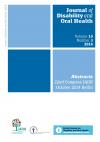Journal of Disability and Oral Health

- Cover Date:
- September 2014
- Electronic ISSN:
- 1470-8558
- Vol:
- 15
- Issue:
- 3
22nd IADH Congress – Abstracts
22nd IADH Congress – 2nd-4th October 2014 – Abstracts
Invited Lecture Abstracts
22nd Congress of the International Association of Disability and Oral Health (IADH), 2nd–4th October 2014, Berlin, Hotel Estrel
Oral Health of Special Olympics athletes in Europe and Eurasia L A M Marks,1(*) C Fernandez,1 S Perlman,2 B Koehler,3 I Kaschke4
1. Special Care in Dentistry, PaeCoMeDis, Ghent university Hospital, Belgium; 2. Special Olympics International, Special Smiles international , Washington, USA; 3. Special Olympics Europe/ Eurasia, Healthy athletes, Brussels, Belgium; 4. Special Olympics Germany, Healthy Athletes, Berlin, Germany. luc.marks@ugent.be
Children with Autism Spectrum Disorder in dentistry Inge Kamp-Becker*
Department of Child and Adolescent Psychiatry, Psychosomatics and Psychotherapy, Medical Clinic, Philipps-University Marburg, Germany. kampbeck@med.uni-marburg.de
Aim: The aim of this study was to examine the oral health of Special Olympics athletes from Europe and Eurasia. Methods: A retrospective longitudinal study was performed with data collected through standardised screening forms and procedures from consenting 15,941 athletes from the annual Special Olympics held in 49 countries, from Europe and Eurasia, between 2007 and 2012. The global Special Olympics Special Smiles protocol was used that was developed in collaboration with Centre for Disease Control (CDC), Atlanta, USA (1998). The use of the data has been approved by the medical ethical committee of Ghent University hospital (Belgium 2013). The data were compiled and transferred to an SPSS data file to be analysed with OneWay ANOVA test and Chi-Square test. The level of significance was predetermined at a p value < 0.05. Results and Conclusions: Although differences per individual country are found throughout the European/ Eurasia data, the present data suggest that there is a high prevalence of gingival signs among individuals with special needs. In 20 countries over 50 % of the athletes showed gingivitis. Moreover high numbers of clinically visual diagnosed caries and dental trauma are found. The findings indicate a serious need for education and oral health preventive programmes for the patients, their parents and caregivers and a serious need for oral health intervention and treatment by the dentist. Acknowledgement: Special thanks to all Special Smiles National Clinical directors in Europe/ Eurasia for the contribution in the study presented.
Autism spectrum disorders (ASD) are severe neurodevelopmental disorders characterised by impairments in social interaction and communication as well as restricted and repetitive behaviour patterns persisting throughout the lifespan. ASD have a detrimental impact on the well-being of affected children and their families. In addition to studies showing an increased prevalence of psychiatric comorbidity such as social anxiety disorder, depression, attentiondeficit/hyperactivity disorder and oppositional-defiant disorder, some data document an increased psychosocial burden upon parents and siblings of children with ASD. Affected persons regularly experience severe difficulties especially in interpersonal relationships, unusual perceptions, and information processing, as well as impairments in emotional regulation. Furthermore, recent studies confirm that, even in people with ASD and good cognitive abilities, social skills remain significantly behind the cognitive level, thus leading to considerable impairment in everyday life. Current research results concerning aetiology, diagnosis and therapeutic interventions will be presented. Based on a short history of ASD, some case vignettes, diagnostic criteria etc., practical relevant information will be provided. Special emphasis will be placed on the treatment of children with ASD in dentistry and the specific features of these patients.
Behaviour management for children with special needs during oral care R Heinrich-Weltzien
Department of Preventive and Paediatric Dentistry, Jena University Hospital, Germany. roswitha.heinrich-weltzien@med.uni-jena.de
Children with disabilities and chronic health conditions are as unique individuals as healthy children. Their ability to cope with oral care is influenced by the development, cognitive maturity, personality, emotions, temperaments,
15/3 | Journal of Disability and Oral Health (2014) | 65
- Article Price
- £15.00
- Institution Article Price
- £
- Page Start
- 65
- Page End
- 125
- Authors
Articles from this issue
- Title
- Pg. Start
- Pg. End
